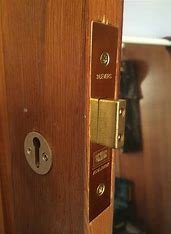Door locks, a seemingly simple yet crucial component of our daily lives, have undergone a remarkable transformation over centuries. From rudimentary wooden latches to sophisticated electronic systems, door locks have played a pivotal role in safeguarding our homes, businesses, and personal belongings. In this comprehensive guide, we will delve into the history, types, and advancements of door locks, exploring their evolution from ancient times to the modern era.
A Brief History of Door Locks
The earliest known door locks can be traced back to ancient Egypt, where wooden pegs were used to secure doors. These pegs were later replaced by keys with intricate patterns, allowing for more complex locking mechanisms. During the Roman Empire, the use of locks spread throughout Europe, with brass and iron becoming popular materials for lock construction.
The Middle Ages witnessed significant advancements in lockmaking, with the development of intricate keyways and tumbler mechanisms. These innovations made locks more difficult to pick and provided a higher level of security. During the Renaissance, locksmithing became a respected craft, with skilled artisans creating ornate and decorative locks.
The Industrial Revolution brought about a major transformation in lock manufacturing, with the introduction of mass production techniques. This led to a decline in the quality of locks, as manufacturers focused on cost-effectiveness rather than security. However, advancements in metallurgy and engineering eventually led to the development of stronger and more reliable locks.
Types of Door Locks
There are numerous types of door locks available today, each with its own unique features and security level. Some of the most common types include:
Deadbolt locks: These locks are considered to be the most secure type, as they are designed to resist forced entry. Deadbolts are typically installed on the front door and are operated by a separate key or knob.
Cylinder locks: Also known as rim locks, cylinder locks are commonly used on interior doors. They consist of a cylinder that rotates when the key is inserted, engaging a series of pins or tumblers.
Lever locks: Lever locks are often found on older homes and have a series of levers that must be aligned in a specific sequence to unlock the door.
Mortise locks: Mortise locks are built into the door itself, providing a high level of security. They are typically used on commercial buildings and high-security residences.
Electronic locks: Electronic locks, such as keypads, biometric scanners, and smart locks, offer advanced security features and convenience. They can be controlled remotely and provide access to authorized individuals only.
Lockpicking and Security Measures
Lockpicking, the art of bypassing a lock without a key, has been practiced for centuries. While it may seem like a skill reserved for criminals, lockpicking can be used for legitimate purposes, such as testing the security of a lock or retrieving a lost key. However, it is important to note that lockpicking is illegal in many jurisdictions.
To protect your home or business from unauthorized access, it is essential to take appropriate security measures. This includes using high-quality locks, changing the locks regularly, and avoiding weak or easily guessed combination codes. Additionally, consider installing a security system with motion sensors, alarms, and surveillance cameras.
The Future of Door Locks
As technology continues to advance, we can expect to see even more innovative and secure door lock systems in the future. Biometric locks that recognize fingerprints, facial features, or even voice patterns are becoming increasingly popular. Smart locks that can be controlled remotely using smartphones or other devices offer added convenience and security.
Furthermore, the integration of door locks with home automation systems is opening up new possibilities. For example, locks can be programmed to automatically unlock when you approach your home or to lock when you leave. This level of automation can significantly enhance your peace of mind and security.
The Psychology of Door Locks: Why We Feel Secure
Beyond their practical function of securing our homes, door locks also serve a psychological purpose. They provide a sense of safety and security, protecting us from potential threats and intruders. This psychological aspect of door locks is deeply rooted in our innate desire for safety and control.
When we lock our doors, we create a physical barrier between ourselves and the outside world. This barrier can help to alleviate feelings of anxiety and vulnerability, providing a sense of comfort and peace of mind. Additionally, the act of locking a door can symbolize our ability to control our environment and protect ourselves from harm.
The psychology of door locks is also influenced by cultural and societal factors. In some cultures, the door is seen as a symbol of protection and hospitality. It is customary to greet guests at the door and to offer them hospitality.
FAQs
Which kind of door lock is the safest?
The most secure kind of door lock is usually thought to be a deadbolt lock. They are designed to resist forced entry and are typically installed on the front door.
How frequently should my home’s locks be changed?
It is recommended to change the locks on your home every few years, especially if you have lost or misplaced keys, or if there has been a break-in.
Can I install a door lock myself?
While it is possible to install a door lock yourself, it is recommended to consult with a professional locksmith to ensure proper installation and avoid security vulnerabilities.
How can I prevent my door lock from freezing during the winter?
To prevent your door lock from freezing, apply a silicone lubricant to the lock cylinder and key. You can also install a heated lock cover to keep the lock warm in cold weather.
In conclusion, door locks have come a long way since their ancient origins. From simple wooden latches to sophisticated electronic systems, locks have played a vital role in protecting our homes and businesses. As technology continues to evolve, we can expect to see even more innovative and secure door lock solutions in the future.
To read more, click here.

Leave a Reply